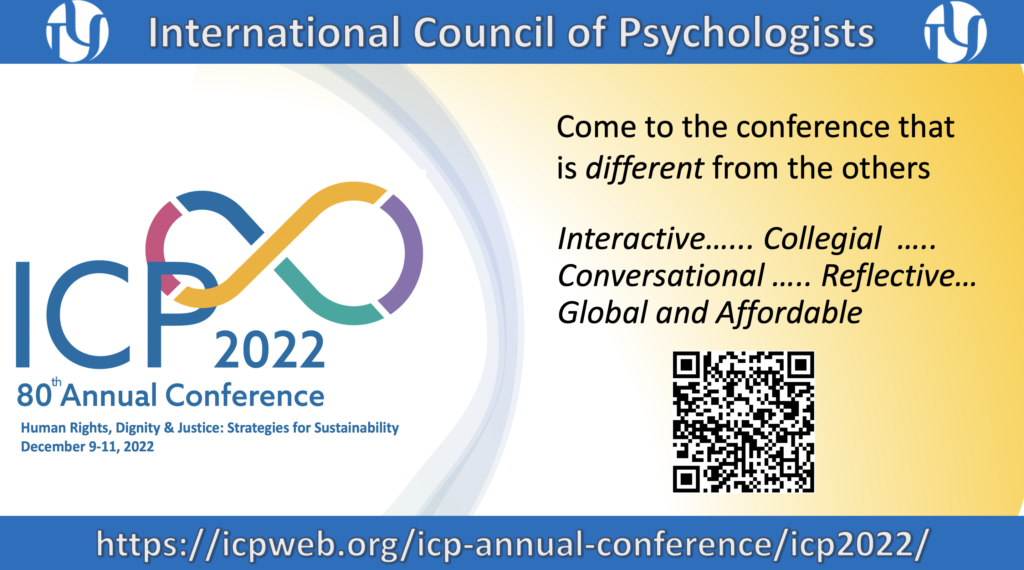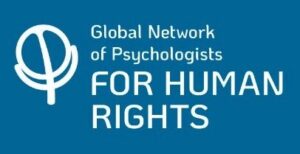
Editor’s Note
The focus in this month’s Bulletin is on World Day against Child Labour, celebrated June 12
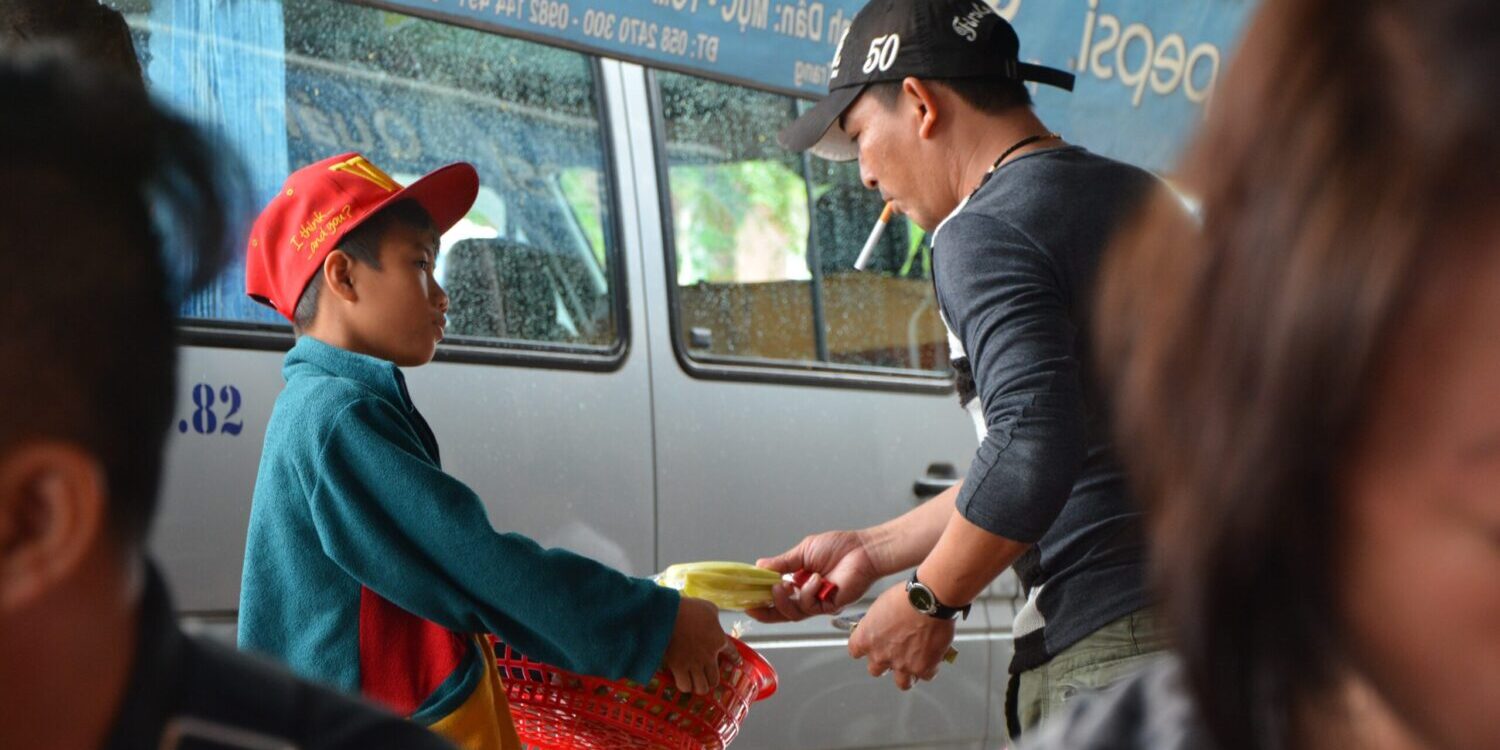
Table of Contents
SPECIAL SECTION
World Day Against Child Labor
World Day against Child Labour, June 19, United Nations.
2023 Theme: Social Justice for All. End Child Labour!
Observed on June 12th, World Day Against Child Labour is intended to serve as a catalyst for the growing worldwide movement against child labour. Emphasizing the link between social justice and child labour, the slogan for the World Day in 2023 is ‘Social Justice for All. End Child Labour!’. Our joint experience in tackling child labour over the course of the last three decades has demonstrated that child labour can be eliminated, if the root causes are addressed. More than ever, it is urgent for all of us to contribute to bringing solutions to people’s daily problems, and child labour is – possibly – the most visible of these problems.
Since 2000, for nearly two decades, the world had been making steady progress in reducing child labour. But over the past few years, conflicts, crises and the COVID-19 pandemic, have plunged more families into poverty – and forced millions more children into child labour.

UNICEF: Economic hardship exacts a toll on millions of families worldwide – and in some places, it comes at the price of a child’s safety. Roughly 160 million children were subjected to child labour at the beginning of 2020, with 9 million additional children at risk due to the impact of COVID-19. This accounts for nearly 1 in 10 children worldwide. Almost half of them are in hazardous work that directly endangers their health and development. See also: https://www.un.org/en/global-issues/children
 Child Labour in Bangladesh. Blog by Md Siddikur Rahman, Senior Team Leader-Future of Work in Bangladesh, CARE Bangladesh.
Child Labour in Bangladesh. Blog by Md Siddikur Rahman, Senior Team Leader-Future of Work in Bangladesh, CARE Bangladesh.
Related article:
Child Labor Is on the Rise. William Finnegan, The NEW YORKER, June 4, 2023. State legislatures across the country [USA] are making it easier to hire minors in low-paid and dangerous jobs.
“You may think that child labor was abolished a century ago, at least in the United States. That was never quite true. The Fair Labor Standards Act, passed during the New Deal, outlawed “oppressive child labor” but exempted agricultural work from many of its restrictions, which, in the decades since, has left hundreds of thousands of children in the fields. In every industry, enforcement of the law has been uneven. States have always been free to strengthen protections, which some did, but challenges to the federal standards have been rare. The Reagan Administration, in its pro-business zeal, proposed lowering the standards, but abandoned the idea under fire from teachers, parents, unions, and Democratic lawmakers armed with Dickens references.
Today, however, child labor in America is on the rise. The number of minors employed in violation of child-labor laws last year was up thirty-seven per cent from the previous year, according to the Department of Labor, and up two hundred and eighty-three per cent from 2015. (These are violations caught by government, so they likely represent a fraction of the real number.) This surge is being propelled by an unhappy confluence of employers desperate to fill jobs, including dangerous jobs, at the lowest possible cost; a vast wave of “unaccompanied minors” entering the country; more than a little human trafficking; and a growing number of state legislatures that are weakening child-labor laws in deference to industry groups and, sometimes, in defiance of federal authority.”
GNPHR NEWS AND EVENTS
Psychology Organizations and Human Rights
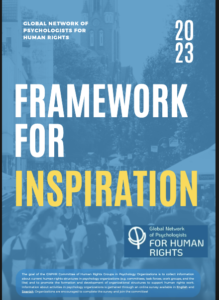 The Network of Human Rights Groups in Psychology Associations has just posted a
The Network of Human Rights Groups in Psychology Associations has just posted a
Framework for Inspiration for psychology or psyhcology-related organizations who are interested in incorporating human rights perspetives or work into their organization. See here: online booklet.
Webinar Series Human Rights Education
Next Webinars:
Dr. Nora Sveaass & Dr. Pau Perez – Torture and the Role of the Psychological Profession.
September 26, 2023, 10 am EDT / 4 pm CEST / 14:00 UTC
Register: https://us02web.zoom.us/webinar/register/WN_fU8o7h1cSnmDtjqjbbOWaw#/registration
CONTENT AREAS AND NEWS
Advocacy / Activism
Meet the psychologist who matchmakes philanthropists with cash-strapped activists
Jessica Kleczka, Euronews, 14 March 2023.
I wonder aloud to Salamon how her background in psychology shaped her approach to climate action. “My diagnosis of our situation is that we’re in a state of mass delusion of normalcy”, she says with what I come to learn is her usual candour, “which is perpetuated by the media and other institutions, but also socially. This is quite challenging, because all you have to do to play a part in perpetuating this delusion is to just continue with life as usual. You could say we’re asleep or in a trance.”“It’s important to understand the forces of normalcy and social conformity. There’s a social psychology experiment where a room is filling with smoke. If all the other people in the room are just sitting there as if nothing was happening, the study subject will also not act. But if one person raises the alarm, it totally changes the dynamic. Yale calls it the ‘Spiral of Silence’ – people don’t talk about climate because other people don’t talk about it. The good news is that we can flip this, and normalise being alarmed about the climate emergency.”
Children/Youth
Promoting global ECD top-down and bottom-up. Seth Oppong (University of Botswana, University of the Witwatersrand, SA), ETHOS, Journal of the society for psychological anthropology, 12 June 2023.
Early childhood science and intervention (ECSI) or simply early childhood development (ECD) is now a multi-billion dollar industry that seeks to export one form of family model, parenting practices, and perspective of child development to the rest of the world. This practice occurs through the efforts of agencies such as the World Health Organization, United Nations Children’s Fund, the World Bank Group, and the LEGO Foundation. This commentary seeks to complement Scheidecker and colleagues’ (2023) arguments emphasizing the role played by academics and practitioners from the majority world who, knowingly or unknowingly, participate in the perpetuation of global ECD. Global ECD is promoted both top-down and bottom-up. While Scheidecker et al. (2023) emphasize the flow of influence from researchers and funding bodies, I provide reasons why participants in the targeted communities might also advocate approaches that reproduce systematic bias. The call for more ethnographic scientific evidence will benefit significantly from academics and practitioners from the majority world themselves more extensively and explicitly resisting the imposition of mainstream perspectives on child development and family models and practices. To make ECD truly global, to support interventions that respect cultures and practices of diverse peoples, requires recognizing multiple forms of childrearing for what they really are—differences and not deficiency.
Climate Justice
Dr Vanessa Kerry appointed as WHO Director-General Special Envoy for Climate Change and Health.
WHO, Geneva, 22 June 2023.
Dr. Kerry has spoken and written about the effects of climate change on human health and health systems and the need to integrate a health-centered response into climate change mitigation and adaptation measures. Dr Kerry is supporting the COP28 Presidency to shape the first-ever COP Day of Health and leading efforts to build advocacy around the impact of climate change on health and ensure equitable and just climate action.
She is a critical care physician at Massachusetts General Hospital (MGH) and is the associate director of partnerships and global initiatives at the MGH Center for Global Health. She directs the Global Public Policy and Social Change programme at Harvard Medical School, focusing on links between security and health. She is the mother of two children.
Crimes against humanity
Eugenics influenced the formulation of the European Convention on Human Rights
Torsten Hjelmar, The European Times, 27 May 2023.
Ongoing research is tracking down the roots to text in the part of the European Convention on Human Rights that delineate, but also limits the right to liberty and security of person. The Parliamentary Assembly Committee in a motion approved in 2022 pointed out, that the European Convention on Human Rights (ECHR) is the only international human rights treaty to include a limitation to the right to liberty specifically on the basis of impairment, with its formulation in Article 5 (1) (e), which excludes certain groups (socially maladjusted individuals in the wording of the European Court of Human Rights) from the full enjoyment of the right to liberty. Eugenics obviously achieved worldwide notoriety with the exposure of concentration camps of Nazi Germany in the 1940s. The Nazi in their efforts to apply biology had carried eugenics to the extreme. Yet, eugenics did not end with the defeat of Nazi Germany. Prof. Turda pointed out that “Eugenic proposals continued to attract political and scientific support after the end of World War II.”
The term “Unsound mind” used in the European Convention on Human Rights
In fact, the very notion of ‘unsound mind’ was re-scripted into the concept of ‘maladjustment’ in the post-war years, and then applied more broadly to perpetuate the eugenic stigmatisation of various social identities. The link between mental disability and social unfitness remained unchallenged. To be sure, the growing influence of environmental and social factors on the development of human behaviour reoriented the language of eugenics; but its main premises, as expressed through both normalizing discourses about social efficiency as well as legal practices centred on the control of reproduction, continued in the post-war period.
Japan sterilisation law victims included nine-year-olds
Derek Cai, BBC News, 20 June 2023.
Two nine-year-olds were among the 25,000 people forcibly sterilised in Japan under its post-World War Two eugenics law, a parliament report has revealed. The law, in place for 48 years, forced people to undergo operations to prevent them having children deemed “inferior”. Many of them had physical or cognitive disabilities, or mental illness. The law is widely recognised as a dark chapter in Japan’s post-war recovery and was repealed in 1996.
On Monday, parliament released a long-awaited 1,400-page study, based on a government investigation which began in June 2020. It acknowledged that about 25,000 people had been subjected to operations – more than 16,000 of which were performed without consent. Some people were told that they were undergoing routine procedures like appendix operations, the report disclosed. Local governments at the time had the power to arbitrarily assign the surgery.
 Dutch king apologises for country’s historical involvement in slavery
Dutch king apologises for country’s historical involvement in slavery
On day to remember 160th anniversary of abolition of slavery in Netherlands, Willem-Alexander says racism is still a problem.
Donna Ferguson, The Guardian, Saturday 1 July 2023.
The Dutch king, Willem-Alexander, has apologised for the Netherlands’ historical involvement in slavery and the effects that it still has today. The king was speaking in Amsterdam on the 160th anniversary of the legal abolition of slavery in the Netherlands, including in former colonies in the Caribbean.
In an emotional speech, he said: “On this day that we remember the Dutch history of slavery, I ask forgiveness for this crime against humanity. As your king and as a member of the government, I make this apology myself. And I feel the weight of the words in my heart and my soul.”
He said racism in Dutch society was still a problem and not everyone would support his apology. However, “the times have changed and keti koti … the chains have truly been broken,” he said to cheers and applause from thousands of onlookers at the national slavery monument in Oosterpark.
Countering the Legacy of Enslavement with Hope and Justice.
United Nations, 22 May 2023, Keynote by Bryan Stevenson, founder and Executive Director of the Equal Justice Initiative, during the “Beyond Colonial Histories” event on Museums and the Transatlantic Slave Trade, held at United Nations Headquarters in New York on 30 March 2023.
The transatlantic trade in enslaved Africans was a global phenomenon. Beyond its obvious and profound impact on the peoples and countries of Africa, the trade in enslaved Africans also affected the nations of Europe. It created the American States—those of North, South and Central America—and had repercussions for Asia, as well.
As the world’s preeminent international organization, the United Nations is the only institution that can connect the multiple players and partners implicated in the global tragedy of the transatlantic trade in enslaved Africans. It is thus appropriate and important that an institution like the United Nations take up the legacy issues surrounding the trade in enslaved Africans and centralize the importance of the story.
Forensic Psychiatrist Calls Ex-C.I.A. Prisoner’s Confession Voluntary. Carol Rosenberg, April 20, 2023, NY Times. Prosecutors enlisted the full-time legal consultant to counter claims that a Saudi prisoner accused in the bombing of the destroyer Cole was in a state of “learned helplessness” at Guantánamo Bay. The psychiatrist, Dr. Michael Welner, was offering an expert opinion as a government consultant to counter arguments by defense lawyers that the prisoner, Abd al-Rahim al-Nashiri, 58, was conditioned to tell federal agents at Guantánamo Bay what they wanted to hear because he had been waterboarded, humiliated, threatened and kept in isolation for years.
Lawlessness Law, Verfassungsblog, 28 April 2023.
Years of inhuman treatment, and now, for the first time, a judgment.
The British House of Commons this week passed a bill of positively exquisite baseness. The Illegal Migration Bill, when it comes into force, will allow the British government to deport people fleeing from formerly colonised regions, who somehow make it to the territory of the arch-coloniser UK, to another formerly colonised region, without the European Court of Human Rights in Strasbourg being able to get in their way with interim injunctions. The UK is not allowed to do that, and they know it, but they do it anyway, not just because, but out of principle.
Decolonization / Indigenization
Landmark resolution for strengthening Indigenous Peoples’ health globally. WHO, Geneva, Switzerland, 29 May 2023.
The World Health Assembly today approved an unprecedented resolution on the health of Indigenous Peoples, which requests the Director-General to develop a global action plan for the health of indigenous peoples and to present it to the Seventy-ninth World Health Assembly in 2026.
Indigenous Peoples, although representing diverse population groups and communities, in general have considerably lower life expectancy than non-indigenous populations. They also have a higher prevalence of many diseases and adverse health conditions, including diabetes, maternal and infant mortality and malnutrition.
The Assembly requested the action plan be developed in consultation with Indigenous Peoples; that WHO provide support to Member States, upon request, for improving indigenous health; and that the improvement of Indigenous Peoples’ health be included in the development of the Fourteenth WHO General Programme of Work.
In the same resolution, the Health Assembly urged Member States to, among other tasks, develop knowledge about the health situation of Indigenous Peoples, with their free, prior and informed consent; develop, fund and implement national health plans, strategies or other measures for Indigenous Peoples; encourage the attraction, training, recruitment and retention of Indigenous Peoples as health workers taking into account the traditional knowledge and practices.
Reclaiming Native Identity in California
Ed Vulliamy, NY Review, June 22 2023.
The American and Sacramento Rivers converge at a wooded bank on the outskirts of California’s state capital. There, on a chilly morning in the spring of 2022, elders, leaders, and members of Native tribes from across California assembled for the first in-person gathering (after months of proceedings online due to Covid-19) of the California Truth and Healing Council. The CTHC has been tasked by Governor Gavin Newsom with collecting testimony, producing a definitive narrative of the Californian Indians—their history, near obliteration, resistance, and survival—and submitting proposals for visibility, recognition, recompense, and restorative justice.
The genocide of Native Americans was nowhere more methodically savage than in California. Nowhere was there such an explicit intention to “exterminate”—the word is used over and over again in state records—the inhabitants of a land supposedly “discovered.” Meanwhile, a brutal slave market for Indians flourished in California just as slavery was about to be abolished in the South.
For Modernity: A Review of Olúfẹ́mi Táíwò’s Against Decolonisation
Thomas Meagher, APA, April 11, 2023.
African intellectual, cultural, and political history are replete with cultural engagements with Europeans, a considerable amount of which, as Táíwò repeatedly notes, preceded colonialism. Before, during, and after colonialism, Africans were agents of intellectual, cultural, and political transformations. Such transformations are, of course, both for better and for worse. But the call for decolonisation2 presupposes that these transformations are by definition for worse, and that African agency in this regard has been either non-existent or regrettable. The upshot is that decolonisation2 fetishizes an imagined, purely autochthonous African past and insists on building African futures in the image of that imagined past. The genuine pasts, presents, and futures produced by African agents are thus to be disposed of, misunderstood, and/or ignored.
To this end, Táíwò offers a compelling account of classic African philosophers of decolonisation as proponents of modernity and critics of decolonisation2. Táíwò presents a strong case for this in the context of Frantz Fanon, Amilcar Cabral, Kwame Nkrumah, and Léopold Sédar Senghor.
Inclusion, Exclusion, Racism
Lack of engagement, lack of accountability, lack of justice – a vicious circle in racist police violence cases
Emma Várnagy, Human Rights Here, 22 May 2023.
This post aims to highlight how a judgment that lacks engagement with the context of institutional racism sustains the accountability gap wherefrom instances of racist police violence arise in the first place. Even though individual accountability for targeting somebody due to their (perceived) ethnicity is indispensable, this is a matter beyond the individual victim and perpetrator. My main point is: without addressing the issue of institutional racism as one of substantive discrimination, the judgments cannot be viewed as delivering full justice.
What is accountability and why does it matter?
Accountability as defined by Mark Bovens (2007:450) is a relationship where a forum may hear an actor justify certain acts in connection with the actor’s obligations for which the actor may face consequences. Phrases such as hearing, obligation, and sanction sound legalistic, but accountability has other dimensions as well. In particular, in the context of international and regional human rights, the ultimate goal is not to establish criminal liability, sentence individuals, or to stamp states as violators, but to safeguard state’s implementation of its human rights obligations. This is why, following a judgment, member states should not only compensate victims by paying damages but address the root cause of the issue to prevent future violations of the same type. This may entail accounting for a sufficient domestic legal framework and effective procedures, training of law enforcement officials, prosecutors and judges, and disseminating the content of the judgment to other actors and the wider public.
The Role of Affective Teacher–Student Relationships in Bullying and Peer Victimization: A Multilevel Meta-Analysis
Isabel M. ten Bokkel, Debora L. Roorda, Marlies Maes, Karine Verschueren & Hilde Colpin, School Psychology Review, 2023, 52 (110-129) – Issue 2: Special Topic Section on Meta-Analyses and Systematic Reviews
Associations between teacher-student relationship quality and bullying were stronger for ethnic minority students and when the same informant reported about both variables. Associations with peer victimization were stronger for negative (e.g., conflict) than for positive (e.g., closeness) relationship indicators and when the same informant was used for both variables. Generally, findings demonstrate that higher-quality teacher-student relationships are related to less bullying perpetration and less peer victimization. Hence, promoting positive and minimizing negative teacher-student relationships may help to tackle school-based bullying and peer victimization.
United Nations Strategy and Plan of Action on Hate Speech on 18 June 2019.
June 18 is the International Day for Countering Hate Speech. In response to the alarming trends of growing xenophobia, racism and intolerance, violent misogyny, antisemitism and anti-Muslim hatred around the world, UN Secretary-General António Guterres launched the United Nations Strategy and Plan of Action on Hate Speech on 18 June 2019.
The UN Strategy can be seen as a learning tool as it presents a strategic vision for the UN to address hate speech, tasks that need to be taken up also by governments, societies, the private sector and all women and men. HREA’s Online Resource Center contains over 30 resources for teaching about freedom from discrimination, as well as freedom of opinion and expression. See more.
Labor and Organizations
Advancing social justice
International Labour Office, Geneva.
The report of the ILO Director-General to the International Labour Conference focuses on the need for greater social justice globally and the means to achieve it, and highlights the opportunities that exist, both nationally and internationally, for furthering the ILO’s human-centred and rights-based approach.
LGBTQI+, Gender Rights
Open letter: Ghana’s new anti-LGBTQ+ bill threatens human rights
16 March 2023. Access Now, March 15, 2023. Signed by 20 Ghanaian and Nigerian human rights organizations.
Recommendations:
- The Committee on Constitutional, Legal and Parliamentary Affairs recommend that Parliament of Ghana reject the Promotion of Proper Human Sexual Rights and Ghanaian Family Values Bill, 2021 in its entirety.
- The Parliament of Ghana reject the Promotion of Proper Human Sexual Rights and Ghanaian Family Values Bill, 2021 in its entirety.
- The Attorney General revises his position on Clauses 12 and 13 of the bill, and recommends that the Parliament should reject the bill in its entirety.
- Members of Parliament safeguard LGBTQ+ people’s human rights by submitting a petition to repeal Section 104 (2) of the Criminal Offences Act, 1960.
Mental Health and Human Rights
Combatting intergenerational effects of psychotrauma with multifamily therapy
Trudy Mooren, Elisa van Ee, Irma Hein and Julia Bala, Frontiers in Psychiatry, 1 February 2023.
There is growing evidence that parental trauma is associated with psychosocial disorders, externalizing and internalizing problems, and higher sensitivity to posttraumatic stress disorder (PTSD) in children. Recent research findings suggest multidimensional relational, psychological, and neurobiological interrelated pathways of intergenerational influence. Moreover, the intergenerational effects of parental trauma need to be understood within a broader systemic context, as a part of family adaptation. This article explores research findings and clinical practice to enhance our understanding of intergenerational processes and presents directions for therapeutic interventions. A trauma-focused multi-family therapy, aiming to restrict the relational consequences of parental trauma and strengthen family resilience, is described. The proposition is that to facilitate and improve the quality of parent–child interaction in response to psychotrauma, fostering emotion regulation capacities and mentalization is crucial. These efforts offered through family group interventions may benefit various families coping with adversity in culturally diverse societies.
General Recommendation No. 37 (2023) on racial discrimination in the enjoyment of the right to health.
The United Nations Committee on the Elimination of Racial Discrimination adopted the first draft submitted by Tina Stavrinaki on General Recommendation No. 37 on racial discrimination in the enjoyment of the right to health. The draft includes recommendations to States and other stakeholders, including health-related private actors. Its text is now available and the Committee invites all stakeholders to submit their comments before August 4th. Published 05 May 2023,
Summary
This general recommendation aims to clarify the obligations undertaken under the International Convention on the Elimination of All Forms of Racial Discrimination (ICERD) regarding the right to health. It identifies common issues of concern and provides guidance on measures to address them, in line with the Convention.
Health for All: Transforming economies to deliver what matters. The WHO Council on the Economics of Health for All
WHO, 23 May 2023.
‘A healthy population is not just human and social capital, or a by-product of economic growth. Health is a fundamental human right.’ (Professor Mariana Mazzucato)
Migration, Refugees, Displacement, Statelessness
The dark incentives that led to a refugee tragedy.
Amanda Taub, NY Times, June 23, 2023.
At the core of the global asylum system lies one simple idea: Every country is obligated to offer protection to any foreign citizen within its borders who meets the legal definition of a refugee, even if they arrived without permission. There is no central authority, no quota system of how many refugees a particular country must take. Just one basic individual right to not be deported into persecution, and one basic governmental obligation to refrain from doing so.
The simplicity of that rule is arguably the system’s greatest strength. It means that vulnerable people do not have to apply for visas before fleeing persecution, and instead they are granted rights simply on the basis of their humanity. Without that rule, it would be far easier for governments to deny protection to people deemed undesirable because of their race, religion or other background.
But it also creates a darker systemic incentive: To those who see refugees as a burden or threat, border security is a zero-sum game that can be “won” by keeping potential asylum seekers out or by forcing them into other countries. That has led to abuses and tragedy as governments go to extreme lengths to prevent migrants from claiming asylum.
The EU pays Africa’s brutal militias to lock up migrants. Britain wants to follow suit.
Racism rebranded: how far-right ideology feeds off identity politics
In an extract from his new book, the Observer columnist describes how substituting ethnic superiority with ‘cultural difference’ has allowed traditional racism to seep back into the mainstream. How can we get out of the box of racial thinking?
Peace / Violence and War
Peace Psychology in Conflict Zones, Psychologists as Agents of Change, by Aimee Karam.
The first conference of the Lebanese Order of Psychologists ( LOPsy), was held on 23 May 23 2023, with the topic: Peace Psychology in Conflict Zones, Psychologists as Agents of Change. The conference was sponsored by the Ministry of Public Health, the World Health Organization in Lebanon and the World Federation for Mental Health.
LOPsy President, Dr. Laila Aqouri Dirani introduced the conference themes and goals. She emphasized the relevance of such a conference in a world where Human Rights and Psychology cannot be dissociated.
Dr. Breeda McGrath (Chicago School of Professional Psychology, and active member, of APA Division 48, Peace Psychology) discussed the many strategies for Peace Psychology and Conflict Resolution with colleagues from LOPsy, H), and the World Health Organization ()WHO.
All the discussion and comments that followed indicated the central role that psychology plays within societies, especially in conflict areas. Each speaker focused on their practice area and field of work in Lebanon: education, hospitals, community political unrest, economic crisis and politic warriors, and subsequently addressed the role of psychology as a lever of change and reform in the community and its contributions and resources in establishing a culture of peace.
The conference ended with a note of Hope, shared support and team alliance in Lebanon and the region.
Ukraine
The War in Ukraine Is a Colonial War
Timothy Snyder, The New Yorker, April 28, 2022.
For centuries, the country has lived in the shadow of empire. But its past also provides the key to its present.
When Vladimir Putin denies the reality of the Ukrainian state, he is speaking the familiar language of empire. For five hundred years, European conquerors called the societies that they encountered “tribes,” treating them as incapable of governing themselves. As we see in the ruins of Ukrainian cities, and in the Russian practice of mass killing, rape, and deportation, the claim that a nation does not exist is the rhetorical preparation for destroying it. Empire’s story divides subjects from objects. As the philosopher Frantz Fanon argued, colonizers see themselves as actors with purpose, and the colonized as instruments to realize the imperial vision. Putin took a pronounced colonial turn when returning to the Presidency a decade ago. In 2012, he described Russia as a “state-civilization,” which by its nature absorbed smaller cultures such as Ukraine’s. The next year, he claimed that Russians and Ukrainians were joined in “spiritual unity.” In a long essay on “historical unity,” published last July, he argued that Ukraine and Russia were a single country, bound by a shared origin. His vision is of a broken world that must be restored through violence. Russia becomes itself only by annihilating Ukraine.
PUBLICATIONS
 Not So Black and White. A History of Race from White Supremacy to Identity Politics,
Not So Black and White. A History of Race from White Supremacy to Identity Politics,
Kenan Malik, 2023, Hurst.
Is white privilege real? How racist is the working class? Why has left-wing antisemitism grown? Who benefits most when anti-racists speak in racial terms?
The ‘culture wars’ have generated ferocious argument, but little clarity. This book takes the long view, explaining the real origins of ‘race’ in Western thought, and tracing its path from those beginnings in the Enlightenment all the way to our own fractious world. In doing so, leading thinker Kenan Malik upends many assumptions underpinning today’s heated debates around race, culture, whiteness and privilege.
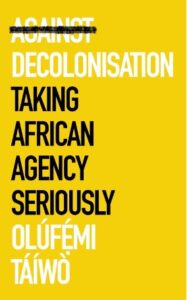 Decolonisation has lost its way.
Decolonisation has lost its way.
Originally a struggle to escape the West’s direct political and economic control, it has become a catch-all idea, often for performing ‘morality’ or ‘authenticity’; it suffocates African thought and denies African agency.
Olúfẹ́mi Táíwò fiercely rejects the indiscriminate application of ‘decolonisation’ to everything from literature, language and philosophy to sociology, psychology and medicine. He argues that the decolonisation industry, obsessed with cataloguing wrongs, is seriously harming scholarship on and in Africa. He finds ‘decolonisation’ of culture intellectually unsound and wholly unrealistic, conflating modernity with coloniality, and groundlessly advocating an open-ended undoing of global society’s foundations. Worst of all, today’s movement attacks its own cause: ‘decolonisers’ themselves are disregarding, infantilising and imposing values on contemporary African thinkers.
This powerful, much-needed intervention questions whether today’s ‘decolonisation’ truly serves African empowerment. Táíwò’s is a bold challenge to respect African intellectuals as innovative adaptors, appropriators and synthesisers of ideas they have always seen as universally relevant.
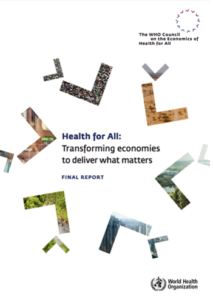 Health for All: Transforming economies to deliver what matters.
Health for All: Transforming economies to deliver what matters.
The WHO Council on the Economics of Health for All, WHO, 23 May 2023.
Professor Mariana Mazzucato: ‘A healthy population is not just human and social capital, or a by-product of economic growth. Health is a fundamental human right.’\
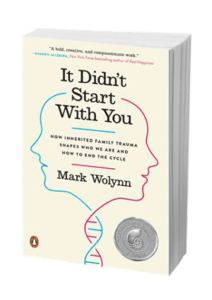 IT DIDN’T START WITH YOU.
IT DIDN’T START WITH YOU.
Mark Wolynn, Viking/Penguin.
Learn how the traumas of our parents, grandparents, and even great grandparents can live in our unexplained depression, anxiety, fears, phobias, obsessive thoughts and physical symptoms—what scientists are now calling “secondary PTSD”.
Documenting the latest epigenetic research—how traumatic memories are transmitted through chemical changes in DNA—and the latest advances in neuroscience and the science of language, It Didn’t Start With You is an accessible and pragmatic guide to breaking inherited family patterns.
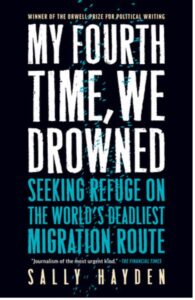 My Fourth Time, We Drowned. Seeking Refuge on the World’s Deadliest Migration Route.
My Fourth Time, We Drowned. Seeking Refuge on the World’s Deadliest Migration Route.
Sally Hayden,
Profoundly shocking, urgent and essential, Hayden’s riveting volume about the twenty-first-century migrant crisis places testimony from a wide range of refugees front and centre, revealing an appalling level of abuse, corruption and cruelty – all tacitly sanctioned by European policy.
OPPORTUNITIES
Exhibits, Events, Courses, Calls for Papers
Listening to youth voices: a call for essays by young people.
The Lancet, Volume 7, ISSUE 7, P449-450, July 2023.
As we mark the 200th anniversary of The Lancet in 2023, we are using this opportunity to draw attention to health issues that we see as critical priorities (“Spotlights”) for the present century.
One of the five Spotlights is on child and adolescent health, which has the following key asks. 1) Children must be immediately prioritised in health and social policies—children and young people deserve attention in their own right, and not only because they are an indispensable foundation for a sustainable future. 2) Governments and health providers should prioritise health equity for children and young people, within and between countries.
CONTACTS: Published by the Global Network of Psychologists for Human Rights – www.humanrightspsychology.org
Disclaimer: The website of the Global Network of Psychologists for Human Rights (GNPHR) contains articles, events and news about the domain where psychology and human rights intersect. The information presented in this Bulletin, does not imply that the GNPHR shares the views and beliefs in the articles.
- @GNPHR1
- How to get involved – read how you can contribute to the global network
- Consider contributing a Blog/Commentary
- News and Bulletins from the GNPHR – Subscribe to GNPHR
- Email addresses:
Ways to Participate in Global Network Activities
- Student/young person representation on the GNPHR Steering Committee
Are you a student or young person (under 35 years of age) interested in joining the GNPHR Steering Committee? The GNPHR invites applications. Role description: The terms of reference broadly define the roles of all members of the steering group. Individual steering committee member tasks include : Each member will take responsibility for one of the following: (a) A specific content area or group of areas; (b) A specific project (e.g. survey of human rights reporting mechanisms; survey of educational programs in psychology/human rights, etc); (c) A specific function: for example, organizing a newsletter; soliciting commentary or newsletter blogs; seeking grant possibilities; outreach to general human rights organizations; outreach to psychology organizations or (d) Consultation: Working in collaboration with other organisations where there is a specific issue. In addition, from time-to-time, short-term subgroups may work on specific projects. In addition, for the student member, there would be a specific remit to liaise with other organisations that are focussed on younger people, psychology and human rights. Click here if you are interested in being nominated. - Share Your Experiences and Examples
One of the best ways to illustrate the intersection of psychology and human rights is through example. We are looking for examples of your encounters with human rights issues in your professional life. You might describe a time when you protected (or failed to protect) human rights, or advocated for what you saw as a human rights issue. The events might be in your clinical, research, academic, applied, or volunteer work. Please send your narrative / story (500-1000 words) to Marlena Plavšić (marlena_plavsic@hotmail.com). We will compile these for publication in the GNPHR Bulletin and on the website. Please also indicate if you would like your stories to remain anonymous. - Share your Expertise and Opinions
We invite you to contribute a blog or opinion piece on general human rights issues; human rights education or strategies for raising the profile of human rights within psychology or your professional life. Students are welcome to contribute, including on student needs for learning about and addressing human rights. Please contact the GNPHR Blog editor (blogeditor@humanrightspsychology.org) with ideas for the article you would like to write! - Send articles/news/events
If you come across a human rights article or news, or know of an upcoming hunman rights event, please send for publication in the Bulletin. Send to the Bulletin editor Polli Hagenaars (polli.hagenaars@gmail.com).

